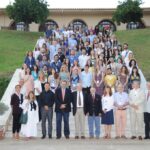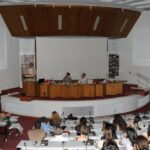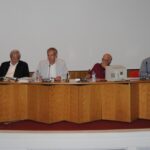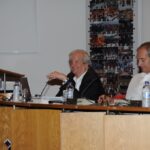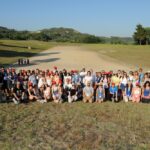The International Olympic Academy (IOA), in cooperation with Harvard’s Center for Hellenic Studies (CHS DC and GR), organized the Fourth Annual International Symposium on “Sports, Society and Culture” in Ancient Olympia, on July 6-9, 2015. Like all previous years, the Symposium hosted scholars from around the world and brought together more than a hundred students and professors from Universities in Greece, America and Canada.
Building on the experience and the material of the previous Symposiums, the specific topic of the 2015 Symposium was “Exploring Excellence.” The 2015 Symposium was meant as a critical exploration of the notion of excellence the way it was experienced in the ancient and the modern Olympic tradition and life, aiming at fostering dialogue between ancient and modern perspectives.
The Symposium commenced with an address from Mr. Isidoros Kouvelos, President of the International Olympic Academy, Prof. Dionyssis Gangas, Director of the International Olympic Academy and Prof. Gregory Nagy, Director of the Center for Hellenic Studies and Francis Jones Professor of Classical Greek Literature and Professor of Comparative Literature at Harvard.
The morning sessions of the Symposium consisted of lectures* by:
- Greg Nagy, on “The athleticism of warfare in Homeric poetry: two heroic examples”
- Yiannis Petropoulos, on “What did ‘excellence’ mean for the Greeks?”
- Lucia Athanassaki, on “Reminiscing about rituals and victory celebrations at Olympia: Pindar’s Olympians 4 and 5”
- Ewen Bowie, on “Cash rewards for superstars in the Roman empire: athletes and sophists”
- Paul Christesen, on “Pulling the Pieces Together: Social Capital and the Olympics, Ancient and Modern”
- Charles Stocking, on “How to Kill an Athlete: The Limits of Excellence, Ancient and Modern”
- Janice Forsyth, on “Aboriginal people and Olympic Games: Will there ever be a meaningful legacy for marginalized peoples?”
- Stamatia Dova, on “‘Worth Visiting Greece for’: Dimitrios Vikelas and the Uniqueness of Olympia”
Short discussion and a Q&A session followed the presentations. In the first evening of the same day, participants and professors visited the Museum of Ancient Olympia and the Archaeological Site where Catherine Pratt, archaeologist and lecturer at the University of Western Ontario, and Maša Culumovic, post-doctoral fellow with the Foundation of the Hellenic World and CHS associate, offered a guided tour. In the evening of the second day all conference participants were divided into smaller workshop groups, which developed the themes of the lectures, broadened the thematic components of the Symposium, and drew connections with contemporary issues. Each group worked with two lecturers, of an either ancient or modern background, enhancing the dialectic relationship between the two perspectives.
The Symposium ended with closing remarks by Professors Gregory Nagy, on behalf of the Center for Hellenic Studies, and Dionyssis Gangas, on behalf of the International Olympic Academy.
The International Olympic Academy and the Center for Hellenic Studies -both in Greece and the US- are constantly working together in order to improve the academic and cultural components of the Symposium and are looking forward to exploring new educational methods for providing a better yet educational experience to participants in future cycles of the Symposium.
*You can read the abstracts of all presentations online at the CHS website.

